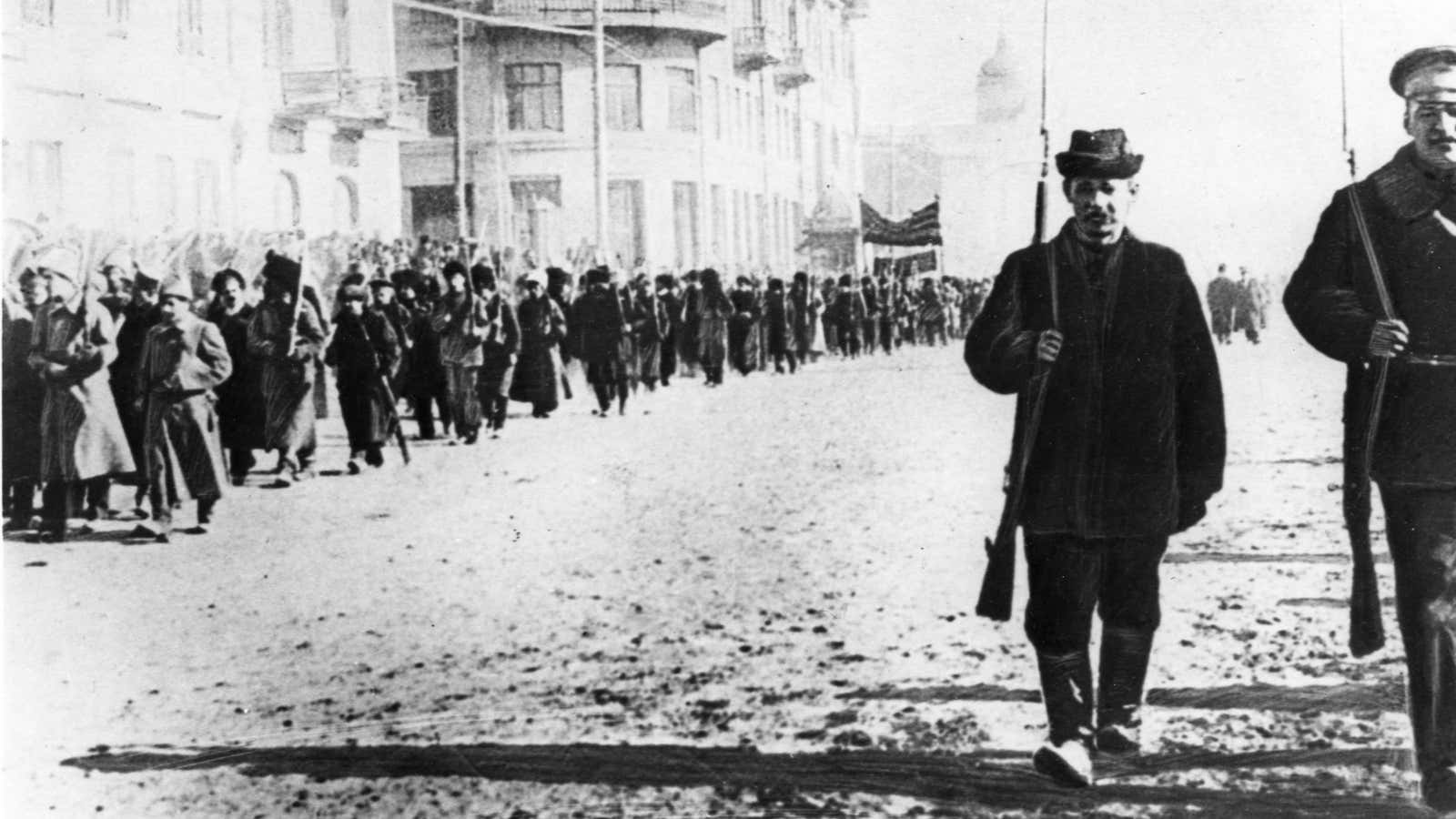This week we learned that missing Pussy Riot member Nadezhda Tolokonnikova is likely on her way to a Siberian penal colony. Members of the punk band are serving sentences for “hooliganism motivated by religious hatred.” Whatever that means, it can apparently get you banished to Siberia in Vladimir Putin’s Russia. The “hooliganism” refers to an impromptu performance the band did in a Moscow church in 2012, during which they asked the Virgin Mary to remove Putin from office.
Tolokonnikova is being transferred to Siberia most likely as punishment for her recent hunger strike and public statements against the deplorable conditions in her current prison in Moscow. The Russian authorities want to get her out of the media spotlight by isolating her.
Pussy Riot, and Tolokonnikova in particular, should find some small comfort in the fact that they are now joining a rich Russian tradition. No matter which capricious and ruthless dictator was ruling Russia, from Tsar Nicholas I, to Stalin, to Vladimir Putin, at one point or another, each banished radicals and dissidents to Siberia.
- The Russian prince turned revolutionary Peter Kropotkin was sent to Siberia, ostensibly on a scientific mission; however, the Tsar threw Kropotkin in jail later on because his travels in Siberia turned him into an anarchist.
- In 1834, Aleksandr Herzen was sent to Siberia for attending a party where songs that were “uncomplimentary” to the Tsar were sung (almost as absurd as “hooliganism”).
- The great science fiction writer Yevgeny Zamyatin, author of the satirical novel We, was exiled to Siberia, first, in 1905 for being a Bolshevik, and then later after the revolution, Zamyatin was banned for criticizing the communist regime.
What sounds like something akin to a death sentence, getting banished to Siberia was almost of a badge of honor among Russian revolutionaries in the 19th century. For one radical in particular, getting sent to Siberia probably saved his life.
The most notorious and feared anarchist in Europe during this time was Mikhail Bakunin, known as the Godfather of modern anarchism, was captured by the Austrian Empire in 1848 for his participation in a worker uprising in Dresden. The Austrians handed Bakunin over to Tsar Nicholas I, who let Bakunin nearly starve to death for seven years in the infamous Peter and Paul Fortress in St. Petersburg.
Bakunin eventually begged the Tsar to be sent to Siberia to escape the horrific conditions in the prison. In 1855, Tsar Nicholas I died, and his son Alexander finally allowed Bakunin to leave the prison for a life sentence in remote Irkutsk, Siberia.
In those days exile to Siberia was simply that—Bakunin was put on a train and dropped off in the small town of Irkutsk to fend for himself. He was not allowed to leave the town of course, which might not sound so bad until you consider that Irkutsk was surrounded by thousands of miles of inhospitable wilderness.
Nevertheless, in 1861 Bakunin, who had been working as a merchant, made a journey down the Amur River and never came back. He traveled from Russia to Japan and eventually landed in San Francisco where he wrote to his long time friend and benefactor, Alexsandr Herzen, in London who published the widely read radical newspaper The Bell. On the front page Herzen ran the headline, “Mikhail Alexandrovich Bakunin is in San Francisco. He is FREE!”
The methods of incarceration in a Siberian camp these days for Nadezhda Tolokonnikova are much more sophisticated than in Bakunin’s day, making the kind of spectacular escape Bakunin made all but impossible. Yet maybe she can find solace and even pride in the fact that she is now a member of Russia’s radical elite. Getting sent to Siberia is a sign that she is doing the right thing.
And who knows, maybe one day we’ll read the headline, “Nadezhda Tolokonnikova is in New York, she is FREE!”
